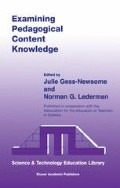Access this chapter
Tax calculation will be finalised at checkout
Purchases are for personal use only
Preview
Unable to display preview. Download preview PDF.
References
American Association for the Advancement of Science (1993). Benchmarks for science literacy. New York: Oxford University Press.
Bleier, R. (1991). Feminist approaches to science. New York: Teachers College Press.
BSCS (1993). Developing biological literacy: A guide to developing secondary and post-secondary biology curricula. Colorado Springs, CO: Biological Sciences Curriculum Study.
Buchmann, M. (1984). The priority of knowledge and understanding in teaching. In L. G. Katz & J. D. Raths (Eds.), Advances in teacher education. Vol. 1 (pp. 29–50). Norwood, NJ: Ablex.
Carlsen, W. S. (1991, April). Pedagogical content knowledge in science teaching: The phlogiston of the 90’s? Paper presented at the annual meeting of the National Association for Research in Science Teaching. Lake Geneva, WI.
Carlsen, W.S., Cunningham, C.M., & Lowmaster, N.E.(1995). But who will teach it? (Review of Benchmarks for Science Literacy). Journal of Curriculum Studies, 27, 448–451.
Camegie Forum on Education and the Economy (1986). A nation prepared: Teachers for the 2lst century. Washington, DC: Author.
Cherryholmes, C. H. (1988). Power and criticism: Poststructural investigations in education. New York: Teachers College Press.
Cunningham, C. M. (1995). The effect of teachers’ sociological understanding of science on classroom practice and curriculum innovation (Doctoral dissertation, Cornell University, 1995). Dissertation Abstracts International, 56, 2542.4.
Cunningham, C. M. (1998). The effect of teachers’ sociological understanding of science (SUS) on curricular innovation. Research in Science Education, 28(2), 243–257.
Cunningham, C. M., & Helms, J. V. (1998). Sociology of science as a means to a more authentic, inclusive science education. Journal of Research in Science Teaching, 35(5), 483–500.
Grossman, P. L. (1990). The making of a teacher: Teacher knowledge and teacher education. New York: Teachers College Press.
Grossman, P. L., & Shulman, L. S. (1994). Knowing, believing, and the teaching of English. In T. Shanahan (Ed.), Teachers thinking, teachers knowing: RefIections on literacy and language ediication (pp. 3–22). Urbana, IL: National Council. of Teachers of English.
Grossman, P. L., Wilson, S. M., & Shulman, L. S. (1989). Teachers of substance: Subject matter knowledge for teaching. In M. C. Reynolds (Ed.), Knowledge base for the beginning teacher (pp. 23–36). Oxford, England: Pergamon.
Hashweh, M. z. (1987). Effects of subject-matter knowledge in the teaching of biology and physics. Teaching & Teacher Education, 3, 109–120.
Holmes Group (1986). Tomorrow’s teachers: A report of the Holmes Group. East Lansing, MI: Author.
Jones, R. (1990). Educational practices and scientific knowledge: A genealogical reinterpretation of the emergence of physiology in post-Revolutionary France. In S. J. Ball (Ed.), Foucault and education: Disciplines and knowledge (pp. 78–104). London: Routledge.
Labaree, D. F. (1992). Power, knowledge, and the rationalization of teaching: A genealogy of the movement to professionalize teaching. Harvard Educational Review, 62, 123–154.
Latour, B., & Woolgar, S. (1986). Laboratory life: The construction of scientific facts. Princeton, NJ: Princeton University Press.
Lyotard J. F. (1984). The postmodern condition: A report on knowledge. Minneapolis: University of Minnesota Press.
McEwan, H., & Bull, B. (1991). The pedagogic nature of subject matter knowledge. American Educational Research Journal, 28, 316–334.
National Research Council (1996). National science education standards. Washington, D.C.: National Academy Press.
National Science Teachers Association (1993). Scope, Sequence, and Coordination of Secondary School Science. Volume I. The content core. Washington, DC: Author.
Nespor, J., & Barylske, J. (1991). Narrative discourse and teacher knowledge. American Educational Research Journal, 28, 805–823.
Piliero, S. C. (1994). The efects of a problem-based curriculum, multi-representational software, and teacher development on the knowledge. beliefs, and practices of a secondary mathematics teacher. Unpublished doctoral dissertation, Cornell University, Ithaca, NY.
Readings, B. (1996). The universify in ruins. Cambridge, MA: Harvard University Press.
Saussure, F. (1916/1966). Course in general linguistics. New York: McGraw-Hill.
Schwab, J. J. (1964). Structure of the disciplines: Meanings and significances. In G. W. Ford & L. Pugno (Eds.), The structure of knowledge and the curriculum (pp. 6–30). Chicago: Rand McNally.
Shulman, L.S. (1986a). Paradigms and research programs inthestudyof teaching: Acontemporary perspective. In M.C. Wittrock (Ed.), Handbookof research on teaching (pp. 3–36). New York: Macmillan.
Shulman, L.S. (1986b). Those who understand: Knowledge growth in teaching. Educational Researcher, 15(2), 4–14.
Shulman, L.S. (1987). Knowledge and teaching: Foundations of thenew reform. Haward Education Review, 57(1), 1–22.
Shulman, L.S., & Sykes, G. (1986). A national board for teaching? In search of a bold standard. Paper commissioned by the Task Force on Teaching as a Profession, Carnegie Forum on Education and the Economy.
Shulman, L. S., Sykes, G., & Phillips, D. C. (1983). Knowledge growth in aprofession: The development of knowledge in teaching. Stanford University.
Socken, H.T. (1987). HasShulman got the strategy right? Harvard Educational Review, 57, 208–219.
Strike, K. A. (1990). Is teaching a profession: How would we know? Journal of personnel Evaluation in Education, 4, 91–117.
Wilson, S.M., Shulman, L. S., & Richert, A E. (1987). “150 different ways” of knowing: Representations of knowledge in teaching. In J. Calderhead (Ed.), Exploring reachers’ thinking (pp. 104–124). London: Cassell.
Editor information
Editors and Affiliations
Rights and permissions
Copyright information
© 1999 Kluwer Academic Publishers
About this chapter
Cite this chapter
Carlsen, W. (1999). Domains of Teacher Knowledge. In: Gess-Newsome, J., Lederman, N.G. (eds) Examining Pedagogical Content Knowledge. Science & Technology Education Library, vol 6. Springer, Dordrecht. https://doi.org/10.1007/0-306-47217-1_5
Download citation
DOI: https://doi.org/10.1007/0-306-47217-1_5
Publisher Name: Springer, Dordrecht
Print ISBN: 978-0-7923-5903-6
Online ISBN: 978-0-306-47217-6
eBook Packages: Springer Book Archive

